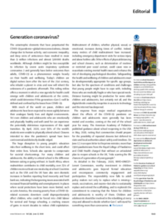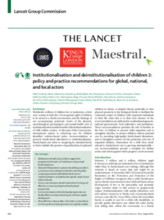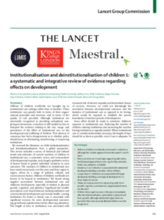Displaying 1341 - 1350 of 4424
This editorial piece from the Lancet posits whether today's children "will be defined and confined by the losses from COVID-19."
This conference seeks to explore how such diverse perspectives can inform a new ethics of adoption and the care of orphaned or abandoned children in Muslim communities.
This webinar focuses on Community-Level Approaches to Child Protection, which replaces the old standard Community-Based Mechanisms.
The Minimum Standards for Child Protection in Humanitarian Action (CPMS) Working Group of the Alliance for Child Protection in Humanitarian Action is launching a new webinar series to introduce the new standards in the 2019 edition of the CPMS.
This online event will launch the Lancet Group Commission on the institutionalisation and deinstitutionalisation of children, which advocates global reform of the care of separated children through the progressive replacement of institutional provision with safe and nurturing family-based care.
This article from Child Rights International Network (CRIN) outlines some of the risks faced by children in residential care institutions during the COVID-19 pandemic and how governments should be responding during – and after – this pandemic.
In this second part of the Lancet Group Commission on institutionalisation and deinstitutionalisation of children, international experts in reforming care for children identify evidence-based policy recommendations to promote family-based alternatives to institutionalisation.
This paper reviews the literature on child institutionalisation and deinstitutionalisation from a global perspective. This review included a survey of historical and cultural trends and estimates of current numbers of children in institutional care, a systematic review and meta-analysis of developmental sequelae, and a largely qualitative review of factors found to predict individual variations in such outcomes.
In this commentary piece, Aisha K Yousafzai - of the Department of Global Health and Population at the Harvard TH Chan School of Public Health and the and Department of Paediatrics and Child Health at Aga Khan University - notes that "the evidence presented [in the Lancet Group Commission on the institutionalisation and deinstitutionalisation of children] and their call to action to ensure abandoned children can thrive in family-based care environments rather than in institutions matters now more than ever as the global community addresses unprecedented challenges to ensure a generation of children are not left behind with respect to their survival, health, development, learning, and safety."
In this commentary piece for The Lancet Psychiatry, Joan Kaufman highlights some key findings and recommendations from the Lancet Group Commission on the institutionalisation and deinstitutionalisation of children.



